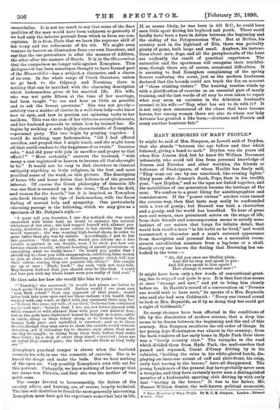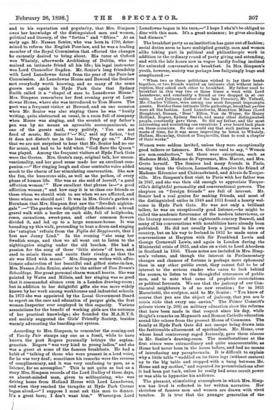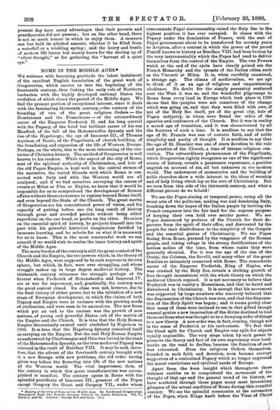MANY MEMORIES OF MANY PEOPLE.* IT might be said of
Mrs. Simpson, as Lowell said of Dryden, that she stands " between the age before and that which followed, giving a hand to each." Dryden was six years old when Ben Jonson died, but he knew Sir William Davenant intimately, who could tell him from personal knowledge of Jonson and Fletcher and other worthies, the friends or followers of Shakespeare, of whom Hazlitt has finely said, "They went out one by one unnoticed, like evening lights."
Sixty years after Jonson's death, Pope, then in his twelfth year, "saw Dryden," and so the ages are linked together, and the notabilities of one generation become the heritage of the next. We confess to a great liking for autobiographies and reminiscences. If the "poorer virtues" areibut vices turned the reverse way, then that taste may easily be confounded with a love of gossip ; but Boswell was both a chatterbox
and a gossip, and the world has benefited. To hear of great men and women, once prominent actors on the stage of life, from their friends and contemporaries seems to satisfy some instinct of our nature that longs for infinite detail, that would fain recall a hero " in his habit as he lived," and would reconstruct a character and a man's outward appearance from description and personal data, as a naturalist recon- structs antediluvian monsters from a leg-bone or a skull.
Surely every one knows the feeling that Browning has em- bodied in the verse :- " Ah, did you once see Shelley plain,
And did he stop and speak to you And did you speak to him again ?
How strange it seems and new !"
It might have been only a few words of conventional greet- ing, but he stopped and spoke to you. It is that fact that seems at once " strange and new," and yet to bring him closely before us. In Hazlitt's record of a conversation on "Persons one would wish to have seen," he speaks of a Mrs. Reynolds who said she had seen Goldsmith : "Every one turned round
to look at Mrs. Reynolds, as if by so doing they too could get a sight of Goldsmith."
So many changes have been effected in the conditions of life by the discoveries of modern science, that a deep line seems to be drawn between the beginning and the end of this century. Mrs. Simpson recollects the old order of things. In her young days Kensington was almost in the country ; from
the back-windows of her early home in Hyde Park Gate there was a "lovely country view." The turnpike in the road which divided them from Hyde Park, the mail-coaches that passed and repassed, Count d'Orsay driving by in his cabriolet, "holding the reins in his white-gloved hands, dis- playing an immense extent of cuff and shirt-front, his crisp,
curly hair waving in the breeze," have all disappeared. The young Londoners of the present day have probably never seen a turnpike, and they have certainly never seen a distinguished member of a fashionable sporting club driving by with curly hair "waving in the breeze." It was to her father, Mr. Nassau William Senior, the well-known political economist,
• Many Memories of Many People. By M. C. M. Simpson. London: Edward A. nold. 11438.]
and to his reputation and popularity, that Mrs. Simpson owes her knowledge of the distinguished men and women, political and literary, of the " forties " and "fifties." At an early age Mr. Nassau Senior, who was born in 1790, deter- mined to reform the English Poor-law, and be was a leading member of the Royal Commission that effected the changes he earnestly desired to bring about. His tutor at Oxford was Whately, afterwards Archbishop of Dublin, who re- mained an intimate friend all his life ; his legal instructor was Lord Chancellor Sngden. Mr. Senior's long friendship with Lord Lansdowne dated from the year of the Poor-law Commission. At Lansdowne House and Bowood the Seniors met everybody worth knowing, and so many of the same guests met again in Hyde Park Gate that Sydney Smith called it a "chapel of ease to Lansdowne House." Mrs. Simpson remembers her first evening party at Lans- downe House, where she was introduced to Tom Moore. The poet was a frequent visitor at Bowood, and on one occasion when Mr. Senior was also staying there he was " busily writing, quite abstracted as usual, in a room full of company when Moore was singing, and the scratch of my father's pen was by no means an agreeable accompaniment, so one of the guests said, very politely, Yon are not fond of music, Mr. Senior No,' said my father, but it does not disturb me in the least. Pray go on." After that we are not surprised to hear that Mr. Senior had no ear for music, and had to be told when "God Save the Queen" was played. Among the frequent visitors at Hyde Park Gate were the Grotes. Mrs. Grote's racy, original talk, her uncon- ventionality, and her good sense made her an excellent com- panion :—" Her ringing laugh and clear contralto voice added much to the charm of her stimulating conversation. She saw the fun, the humorous side, as well as the pathos, of every phase of human life. She was as she said of herself, a good affliction woman." How excellent that phrase is—" a good affliction woman ; " and bow easy it is to class our friends as those whom we should wish to see when we are afflicted, and those whom we should not ! It was in Mrs. Grote's garden at Burnham that Mrs. Simpson first saw the "Swedish nightin- gale" :—" The garden was delightfully old-fashioned : a broad gravel walk with a border on each side, full of hollyhocks, roses, carnations, sweet-peas, and other common flowers divided it, and led up to a large summer-house. It was bounding up this walk, pretending to beat a drum and singing the rataplan ' refrain from the Figlia del Reggimento, that I first saw Jenny Lind." In the evening " she sang her Swedish songs, and then we all went out to listen to the nightingales singing under the old beeches. She had a passion for the song of these 'little sisters' of hers, and ased to mimic them and excite their rivalry, so that the air was filled with music." Mrs. Simpson writes with affec- tionate admiration of her beautiful and gifted sister-in-law, Mrs. Nassau John Senior, sister to the author of Torn Brown's Schooldays. Her great personal charm won all hearts. She was painted by Watts and Millais, and her singing was so good that it commanded silence even in a London drawing-room ; but in addition to her delightful gifts she was more widely known by her work among workhouses and industrial schools. In 1873 she was appointed by the Local Government Board to report on the care and education of pauper girls, the first woman-Inspector ever employed in this capacity. Various associations for the benefit of working girls are the outcome of her practical knowledge ; she founded the M.A.B.Y.S. and mainly suggested the Girls' Friendly Society, besides warmly advocating the boarding-out system.
According to Mrs. Simpson, to remember the coming-out of Vanity Fair stamps any one as a fossil, while to have known the poet Rogers personally betrays the septua- genarian. Rogers " was very kind to young ladies," and she was a guest at some of the famous breakfasts. He had a habit of "talking of those who were present in a loud voice, for he was very deaf ; sometimes his remarks were the reverse of complimentary, and it was very confusing to pass, as a listener, for an accomplice." This is not quite so bad as a story Mrs. Simpson records of the Lord Dudley of those days, an absent-minded man, given to soliloquising, who was driving home from Holland House with Lord Lansdowne, and when they reached the turnpike at Hyde Park Corner began aloud,—" I suppose I must ask this man to dinner. It's a great bore; I don't want him." Whereupon Lord Lansdowne began in his turn,—" I hope I sha'n't be obliged to dine with this man. It's a great nuisance; he gives shocking bad dinners."
The breakfast party as an institution has gone out of fashion; social duties seem to have multiplied greatly, men and women alike taking part in political and philanthropic work in addition to the ordinary round of party giving and attending, and with the late hours now in vogue hardly feeling inclined for animated conversation at breakfast. In Mrs. Simpson's youth, however, society was perhaps less fatiguingly huge and complicated :—
" When two or three politicians wished to lay their heads together, or two friends wanted an intimate chat without inter- ruption, they asked each other to breakfast. My father used to breakfast in this way two or three times a week with Lord Lansdowne, and constantly a friend or two dropped in at our table. Lord Dalmeny (father of the late Premier), Mr. Tufnell, Mr. Charles Villiers, were among our most frequent impromptu guests. Besides these intimate little gatherings, breakfast parties were all the fashion. Lord Lansdowne, Monckton Milnes (Lord Houghton), Bunsen, ' Bear ' Ellice, Van de Weyer, Sir Henry Holland, Rogers, Sydney Smith, and many other distinguished people, constantly gave them. So did my father, and the most interesting and nourishing conversations I ever heard took place on these occasions. No one could say that such parties were a waste of time, for it was more improving to listen to Whately. Hallam, Macaulay, Guizot or Tocqueville, than to read a chapter of their works."
Women were seldom invited, unless they were exceptionally good talkers or listeners. Mrs. Grote used to say, " Women are non-conductors," but there were exceptions, such as Madame Mohl, Madame de Peyronnet, Mrs. Marcet, and Mrs. Grote herself. The Seniors had many friends in Paris, among them the Guizots, Lamartines, Ampere the friend of Madame R4camier and Chilteaubriand, and Alexis de Tocque- ville. Mrs. Simpson's first visit to Paris with her father was in 1847, and she was then old enough to appreciate Tocque- ville's delightful personality and conversational powers. The chapters on " foreign friends " are full of interest. Mr. Senior had a real genius for making friends, and most of the distinguished exiles in 1848 and 1851 found a hearty wel- come in Hyde Park Gate. He was not only a brilliant talker, be was an exceptionally good listener,—he might be called the academic forerunner of the modern interviewer, or the literary successor of the eighteenth-century Boswell, and many of his conversations with notabilities have already been published. He did not usually keep a journal in his own country, but on his way to Ireland in 1852 he made notes of conversations at Harpton with Sir Frankland Lewis and George Cornewall Lewis, and again in London during the Ministerial crisis of 1855, and also on a visit to Lord Aberdeen in Scotland in 1856. These notes are included in Mrs. Simp- son's volume, and though the interest in Parliamentary changes and chances of fortune is perhaps more ephemeral than in any other public event, they cannot fail to be of interest to the serious reader who cares to look behind the scenes, to listen to the thoughtful utterances of public men, and to note what came of prophetic enunciations or political forecasts. We see that the jealousy of our Con- tinental neighbours is of no new creation ; for in 1855 Marochetti, the sculptor, said to Mr. Senior : " You know of
course that you are the object of jealousy, that you are le voisin riche that every one envies." The Prince Consort's private views (p. 208) on military education show the reforms
that have been made in that respect since his day, while Bright's remarks on Maynooth and Roman Catholic education sound like echoes from the present House of Commons. The family at Hyde Park Gate did not escape being drawn into the fashionable allurement of spiritualism. Mr. Home, over whose head controversy raged furiously, gave three games in Mr. Senior's drawing-room. The manifestations at the first séance were extraordinary and quite unaccountable, as Home had never been in the house before, and had no means of introducing any paraphernalia. It is difficult to explain why a little table "waddled on its three legs (without castors) up to the big table and stopped with a bang between Mr. Home and my mother," and repeated its perambulations after it had been put back, unless he really had some occult power or was able to hypnotise his audience.
The pleasant, stimulating atmosphere in which Mrs. Simp- son has lived is reflected in her written narrative. Her sketches of famous men and women are drawn with vivid touches. It is true that the younger generation of the present day have many advantages that their parents and grandparents did not possess ; but on the other hand, there is not so much leisure in which to enjoy them. A measure can but hold its allotted amount, whether it be filled from a waterfall or a trickling spring ; and the hurry and bustle of modern life leaves but scanty hours for the storing up of "silent thought," or for gathering the "harvest of a quiet eye."








































 Previous page
Previous page